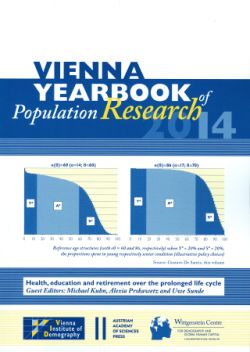
Vienna Yearbook of Population Research 2014, pp. 115, 2015/12/23
Health, Education, and Retirement over the Prolonged Life Cycle

As the baby boom cohort approaches retirement, there has been considerable uncertainty about the economic sustainability of the social security systems in most of the developed world. In recent decades, Spain has had both one of the oldest populations and the lowest levels of employment among the population aged 50 and over in Europe. This article addresses these issues by investigating the relationship between ageing and labour participation in the adult population. We examine the changes in employment exit patterns among men and women between 1999 and 2012, and the factors which influence early retirement, using the Spanish Labour Force Survey (panel dataset).We found clear gender effects in retirement behaviour in terms of the shares of the population who were not working and the predictors of early retirement. The partner is shown to be more relevant in the retirement timing decisions of men, while dependents are found to be more relevant in the decisions of women. Moreover, the likelihood of exiting the labour market early appears to be decreasing among women, and increasing among men.